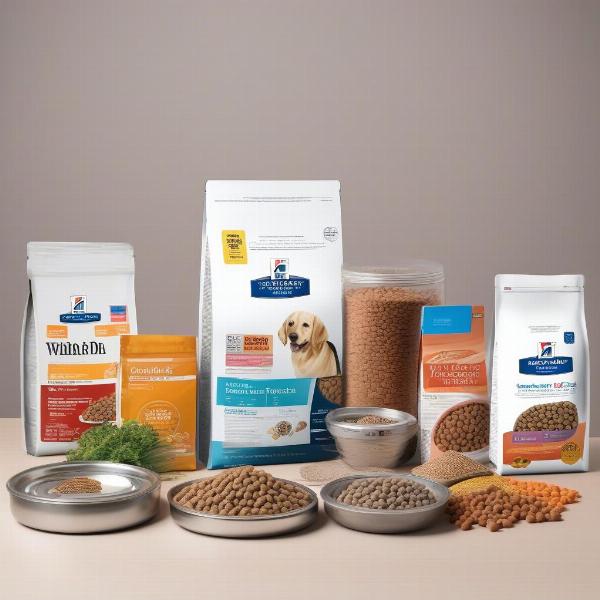Dealing with colitis in your canine companion can be a worrying experience. Finding the best dog food for colitis is crucial for managing this inflammatory bowel disease and ensuring your dog’s comfort and well-being. The right diet can significantly reduce inflammation, alleviate symptoms, and promote a healthy gut.
Understanding Canine Colitis and the Importance of Diet
Canine colitis is a common condition characterized by inflammation of the colon. Symptoms can include frequent, loose stools often containing mucus or blood, straining to defecate, abdominal pain, and decreased appetite. While various factors can contribute to colitis, diet plays a vital role in both its development and management. Certain ingredients can trigger or worsen inflammation, while others can soothe the gut and promote healing.
Choosing the Best Dog Food for Colitis: Key Considerations
Selecting the right dog food for colitis involves considering several key factors:
- Highly Digestible Ingredients: Look for foods with easily digestible protein sources like chicken, turkey, or fish. Avoid complex proteins that can be harder for a sensitive gut to process.
- Limited Ingredient Diets: These diets contain fewer ingredients, making it easier to pinpoint potential allergens or irritants.
- Fiber Content: Both too much and too little fiber can exacerbate colitis symptoms. A moderate amount of soluble fiber can help regulate bowel movements.
- Prebiotics and Probiotics: Prebiotics nourish beneficial gut bacteria, while probiotics introduce these bacteria directly. Both can support a healthy gut microbiome and reduce inflammation.
- Omega-3 Fatty Acids: These fatty acids have anti-inflammatory properties and can help soothe the irritated colon.
Types of Dog Food Suitable for Colitis
Several types of dog food can be beneficial for managing colitis:
Hydrolyzed Protein Diets
These diets contain proteins that have been broken down into smaller pieces, making them less likely to trigger an allergic reaction or inflammation.
Novel Protein Diets
These diets use protein sources that are less common in dog food, such as venison, duck, or kangaroo. This can be helpful for dogs with food allergies or sensitivities that contribute to their colitis.
Prescription Diets
Your veterinarian may recommend a prescription diet specifically formulated for dogs with gastrointestinal issues, including colitis. These diets often contain highly digestible ingredients, prebiotics, and probiotics.
 Different types of dog food suitable for colitis
Different types of dog food suitable for colitis
What to Avoid in Dog Food for Colitis
Certain ingredients can worsen colitis symptoms and should be avoided:
- Artificial Colors, Flavors, and Preservatives: These additives can irritate the sensitive gut.
- High-Fat Diets: Excess fat can be difficult to digest and can exacerbate inflammation.
- Common Allergens: Ingredients like beef, dairy, and wheat are common allergens and can trigger or worsen colitis symptoms.
Transitioning to a New Diet
When switching your dog to a new food, do so gradually over several days to avoid further upsetting their digestive system. Start by mixing a small amount of the new food with their current food and gradually increase the proportion of the new food over time.
Monitoring Your Dog’s Response
Once you’ve transitioned your dog to a new diet, carefully monitor their symptoms. If their colitis improves, continue with the new food. If symptoms persist or worsen, consult your veterinarian. They may recommend further diagnostic testing or a different dietary approach.
Conclusion
Finding the best dog food for colitis is a crucial step in managing this condition. By choosing a diet with highly digestible ingredients, avoiding potential irritants, and working closely with your veterinarian, you can help your dog find relief from colitis symptoms and enjoy a healthier, more comfortable life. Remember, dietary management is a key component of long-term colitis control.
FAQ
- What are the signs of colitis in dogs? Frequent, loose stools (often with mucus or blood), straining to defecate, abdominal pain, and loss of appetite are common signs.
- Can stress cause colitis in dogs? Yes, stress can be a contributing factor to colitis flare-ups.
- Is colitis in dogs curable? While there isn’t a cure, colitis can be effectively managed with appropriate diet and medication.
- How long does it take for a dog’s colitis to improve with a new diet? Improvement can be seen within a few days to a week, but it may take longer for some dogs.
- Are homemade diets good for dogs with colitis? Homemade diets can be beneficial, but it’s crucial to consult with a veterinary nutritionist to ensure they meet your dog’s nutritional needs.
- Can probiotics help dogs with colitis? Yes, probiotics can support gut health and may help reduce inflammation.
- What should I do if my dog’s colitis doesn’t improve with a new diet? Consult your veterinarian for further evaluation and recommendations.
ILM Dog: Your Partner in Canine Care
ILM Dog is your trusted resource for all things canine. We offer expert advice on dog breeds, health, training, nutrition, grooming, and more. Our mission is to empower dog owners with the knowledge and resources they need to provide the best possible care for their furry companions. Whether you’re a seasoned dog owner or just starting your journey, ILM Dog has the information you need. Contact us today at [email protected] or +44 20-3965-8624 for personalized advice.